
Metal Roofing Gauge Comparison: 22 vs 24 vs 26 vs 29
When it comes to choosing the right materials for your roof, understanding the implications of metal roofing gauge sizes is paramount.
This crucial factor determines the durability, weight, and overall performance of your roof.
In this guide, we will go over a comprehensive comparison between some of the most common gauges in metal panels used for roofing.
With these insights, you’ll have all the necessary information to make the right decision for your roofing needs.
What gauge is metal roofing?
In the roofing business, gauge refers to the thickness of the metal panel. Lower gauge numbers indicate thicker metal, whereas higher gauge numbers denote thinner metal. This means that the gauge measurement plays a crucial role in determining the durability and performance of a metal roof.
The gauge can significantly affect the roof’s ability to withstand various environmental factors:
- Lower gauge: More robust, providing superior resistance against strong winds, hailstorms, and heavy snowfall. The added thickness offers an extra layer of protection, ensuring that the roof remains intact even in harsh weather conditions.
- Higher gauge (thinner) roofs: Lighter in weight and often more cost-effective, making them a popular choice for budget-conscious homeowners. May not provide the same level of durability and protection as their thicker counterparts and are more susceptible to damage from severe weather. May also require more frequent maintenance and repairs.
As you’d might expect, though, it’s not as clear cut as going for the lower gauge, so we need to dive into the intricacies, comparing the different thicknesses.
HIGH-QUALITY
ROOF REPLACEMENT
YOU CAN RELY ON
Choose Prairie Exteriors for durable, dependable asphalt roofing solutions designed to stand the test of time.
The most common metal roof gauges explored
The most common gauges you’ll find are 22, 24, 26, and 29, with each having unique characteristics, advantages, and potential challenges.
By understanding the nuances of each of these, you’ll be better equipped to choose the most suitable option for your project, weather conditions, and budget constraints.
22 gauge metal roofing
22 gauge metal roofing is the thickest and most durable option and is known for its superior resistance to harsh weather conditions, including strong winds, heavy snowfall, and hailstorms. Its high durability can be attributed to the lower gauge number, which denotes a thicker metal was used during fabrication.
Despite being the heaviest option, its durability means it requires less frequent maintenance and repairs compared to higher gauge roofs. However, this increased strength and longevity come with a higher price tag, making it a more significant investment upfront.
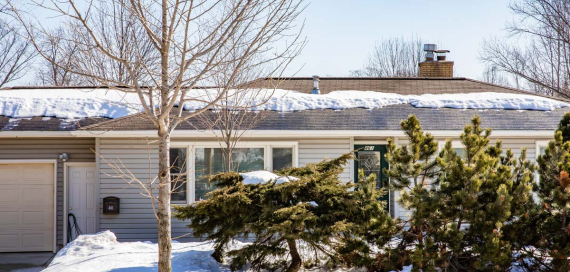
How thick is 22 gauge metal roofing?
22 gauge metal roofing is 0.0299 inches thick. The thicker panels translates to a reduced chance of denting, but it’s also heavier compared to thinner gauges. This means that additional structural support may be required for installation, adding to the overall cost.
Is 22 gauge metal roofing good?
Yes, 22 gauge metal roofing is a good choice due to its thickness and durability. It can withstand harsh weather conditions, has lower maintenance needs, and offers long-term roofing protection. This makes it a worthwhile investment for homeowners looking for a durable and long-lasting roofing solution.
However, due to its higher cost and weight, this size may not be the best fit for everyone. For example, if you’re on a tight budget and live in an area with a mild climate, then a 22 gauge metal roof is probably overkill.
In such cases, a thinner gauge could suffice, offering significant cost savings without compromising on quality and protection.
24 gauge metal roofing
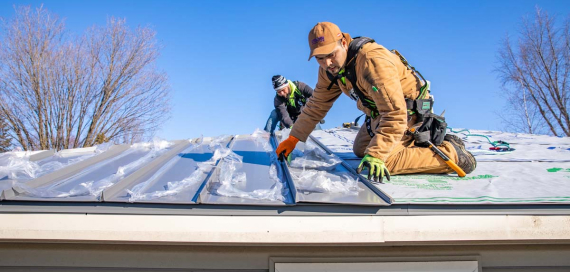
24 gauge metal roofing is the industry standard. While it’s not as thick as the 22″ option, he slightly thinner metal results in a lighter metal roof for your home. This makes it easier to install and less demanding in terms of structural support.
How thick is 24 gauge metal roofing?
24 gauge metal roofing is 0.0250 inches thick. This mid-range option offers a respectable balance between durability and affordability for homeowners. The reduced thickness does not significantly compromise the metal roof’s resistance to adverse weather conditions, making it a suitable choice for homes in most regions.
However, keep in mind that the thinner metal may be more prone to dents and damage compared to thicker gauges, which could result in higher maintenance and repair costs over time. Therefore, it’s crucial to evaluate your home’s specific location, climate conditions, and budget beforehand.
Is 24 gauge metal roofing good?
A 24 gauge metal roofing is a good choice and offers decent protection against harsh weather conditions, is lighter and easier to install compared to thicker gauges, and comes at a more affordable price point. It’s a good choice if your region has a mild climate.
However, if you experience severe weather events often or are looking for maximum durability and longevity, it may be worth considering a thicker option.
26 gauge metal roofing
26 gauge metal roofing presents a practical, cost-effective solution for homeowners seeking durability without the extra weight and cost associated with thicker gauges. As a thinner option in the world of metal roofing, it is lighter, easier to install, and comes at a more affordable price point.
However, it’s important to remember that while thinner materials can save on costs, they may be more susceptible to damage from severe weather conditions and require more frequent maintenance.
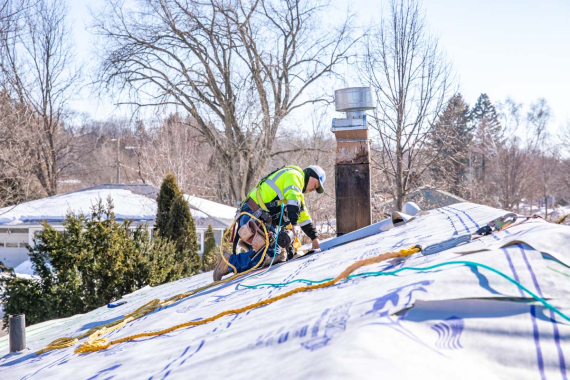
How thick is 26 gauge metal roofing?
26 gauge metal roofing is 0.0188 inches thick. The reduced thickness makes it lighter, lessening the strain on a home’s structural support. It’s a suitable choice for homes unable to bear the load of thicker gauges, or if you want to reduce the cost of a roofing project.
Is 26 gauge metal roofing good?
Despite being on the thinner end of the spectrum, 26 gauge metal roofing can still provide adequate protection for your home. It’s a popular choice among homeowners on a budget, as it offers decent durability and comes at a more affordable price point compared to thicker gauges.
29 gauge
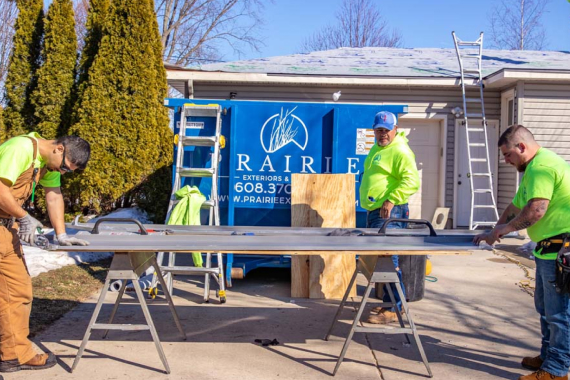
29 gauge is the thinnest of the most common options. Applications are more limited with this gauge, as it’s typically used on sections that do not require as much load-bearing capacity or protection from severe weather.
This includes siding and decorative applications, as well as smaller roofing sections such as carports or sheds. It’s often used in combination with a thicker choice in areas where their flexibility and lower weight help with the installation process.
How thick is 29 gauge metal roofing?
29 gauge metal roofing is approximately 0.0142 inches thick, making it significantly thinner than other gauges used in roofing applications. Its reduced thickness makes it lighter and more flexible, allowing for easier handling and installation in certain areas where they’re less exposed to the harsh elements.
Note that while this gauge may be more affordable upfront, it may require more frequent maintenance and repairs over time due to its limited durability.
Is 29 gauge metal roofing good?
Yes, but only when it’s used for the right reasons. 29 gauge isn’t as durable as thicker gauges and may not provide adequate protection in areas prone to harsh weather conditions. However, for smaller sections or decorative purposes, it can be a cost-effective option.
Of course, it’s essential to consider the specific needs and environmental factors of your home before deciding on this gauge. Even if you reside in a region with mild weather, areas of your roof that are more exposed or receive more impact may require a thicker gauge for better protection.
UPGRADE YOUR ROOF WITH CONFIDENCE
Protect your home with durable, high-quality roofing from Prairie Exteriors. Trusted and reliable solutions.
In Wisconsin and need more guidance on metal roof thickness?
With this in mind, if you want to get us to quote you for your roof replacement and are in Wisconsin, get in touch with us!
Metal roofing gauge comparison: 22 vs 24 vs 26 vs 29 gauge
Now that we’ve covered the most commonly used gauges, let’s do a quick comparison to help you better understand the differences between them.
Knowing how they stack up against each other can help you make a more informed decision when choosing the best option for your home.
22 gauge vs 24 gauge
- Thickness: 22 is thicker than 24. It measures approximately 0.030 inches, while the 24 gauge measures around 0.025 inches.
- Durability: Owing to its greater thickness, 22 gauge tends to offer higher durability than 24. Both are robust choices for most residential projects, but for homes located in areas prone to severe storms, a 22 gauge or heavier is recommended for maximum durability.
- Cost: 24 gauge is generally less expensive than 22 due to its thinner profile. The cost can vary widely and is influenced by factors such as the material used, the brand, and the region of purchase.
- Weight: 24, being thinner, has a lighter weight. This can make installation easier and puts less structural weight on your building.
- Applications: While both gauges are widely used in residential roofing, 24 gauge is more versatile and can be used in various applications. A 22 gauge roof is difficult to install on more complicated roof designs, making it better suited for simpler roof structures.
24 vs 26 gauge metal roof
- Thickness: 24 gauge has a thickness of approximately 0.025 inches while 26 gauge is slightly thinner at around 0.0188 inches.
- Durability: While both gauges offer adequate protection, 24 gauge tends to be more durable due to its greater thickness. Although 26 gauge is also robust, it may be more susceptible to denting and damage from severe weather.
- Cost: Typically, 24 gauge is more expensive than 26. This is due to the material cost and the increased durability that comes with a thicker gauge. However, if budget is a concern, 26 provides a balance between cost and performance.
- Weight: Being thinner, 26 is lighter than 24 counterpart, reducing the strain on a building’s structural support and making it easier to install.
- Applications: Both are suitable for a wide range of applications. However, for homes in regions with mild weather conditions, 26 is a more cost-effective option, while in areas prone to severe weather, 24 is better for longevity and durability.
26 vs 29 gauge metal roofing
When comparing 29 vs 26 gauge metal roofing, consider the following factors:
- Thickness: 26 is thicker than 29. The thickness of a 26-gauge roof is approximately 0.0188 inches, while a 29-gauge roof measures around 0.0142 inches.
- Durability: Due to the thicker profile, a 26-gauge metal roof tends to offer more durability than a 29-gauge roof. Though both can adequately serve many applications, if your home is located in an area prone to severe weather conditions, 26 will offer better protection.
- Cost: Generally, 26 is more expensive than 29 due to its thicker profile, which influences its durability and longevity. However, if budget is a factor, 29 is a less expensive option, though it may require more frequent maintenance or replacement.
- Weight: Given its thinner profile, 29-gauge is lighter, which makes for an easier installation process and puts less structural weight on your building.
- Applications: 26-gauge has a more versatile application range and can withstand harsher environmental conditions. In contrast, 29-gauge works well for smaller sections, decorative purposes, or areas less exposed to severe weather.
Each gauge has its pros and cons; the choice should be based on your specific needs and environmental conditions. Remember, while cost is an important factor, it should not be the only determinant. Consider the long-term benefits and durability when choosing the gauge for your metal roof.
Metal roof gauge thickness chart
If you’re still confused as to the thickness (most think that a higher gauge = a higher thickness), refer to this metal roof gauge thickness chart:
| Gauge | Thickness (inches) |
| 20 | 0.0375 |
| 22 | 0.0299 |
| 24 | 0.0250 |
| 26 | 0.0188 |
| 29 | 0.0142 |
Note that these figures are only standard estimates and the actual thickness may vary depending on the type of metal alloy used and the manufacturing process.
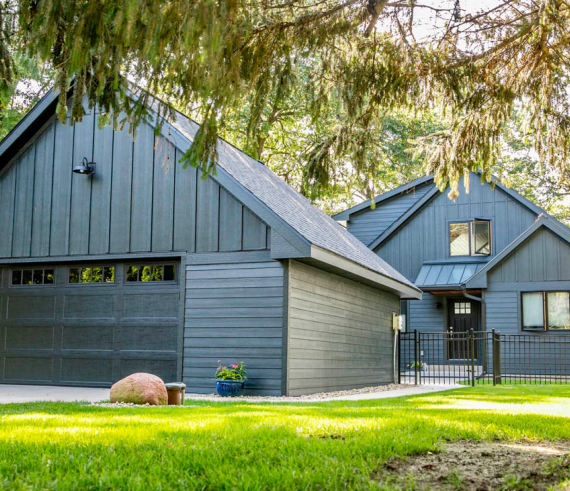
For example, a 24 gauge steel roof may have a slightly different thickness than a 24 gauge aluminum or copper roof. Similarly, additional coating or paint layers may also affect the final thickness of a metal roof.
How to choose the right metal roof gauge for your home
Choosing the right gauge for your home might seem daunting, but by considering a few key factors, this decision can be significantly simplified.
Here are some tips to guide you:

- Environmental conditions: Consider your local weather patterns. If your region frequently experiences heavy snow, hail, or high winds, a thicker gauge (such as 24) may be best for its added durability. On the other hand, for milder climates, a 26 or 29 could be sufficient.
- Project budget: Gauge directly impacts the cost of your roofing materials. Thicker gauges, being more durable and heavy-duty, tend to cost more. However, remember that while it may be tempting to save money upfront with a thinner gauge, you might end up paying more in the long run if it needs to be replaced sooner.
- Building structure: The thinner the gauge, the lighter the weight. If your structure is older or has limitations, a lighter gauge (like 26 or 29) might be a better choice to avoid adding unnecessary stress to the structure.
- Aesthetic considerations: If you’re installing metal roofing, a thinner, more flexible gauge (like 29) could be best. It bends and forms to various shapes more easily, perfect for creating unique architectural features.
With this in mind, if you want to get us to quote you for your roof replacement and are in Wisconsin, get in touch with us!
What gauge of metal roofing is best? Our Key takeaways
The best gauge for residential solutions largely depends on your specific needs and environmental conditions. There’s no one-size-fits-all answer, so carefully consider various factors before making a decision. However, for overall durability and longevity, the 24-gauge metal roofing is often favored by roofing contractors.
Ultimately, factors like budget, building structure, and aesthetics can all play a role in determining the most suitable gauge for your metal roof.
For instance, if you’re on a tight budget, a 26 or 29-gauge might be a more cost-effective option.
Alternatively, if your home is located in a region where heavy snowfall and strong winds are common, a 24 gauge or heavier might be necessary.
Additional reading: what is a drip edge
FAQs on metal roofing gauges
Is 22 gauge smaller than 24?
No, 22 gauge isn’t smaller than 24. A lower gauge indicates a thicker metal. So, a 22-gauge metal roof is bigger than a 24-gauge roof. The thicker the metal, the greater its ability to withstand external forces such as blunt impact and weather damage.
Is 24 gauge thicker than 26?
Yes, 24 gauge is indeed thicker than 26 gauge. This means that a 24-gauge metal roof offers added durability and resistance to various weather conditions.
Is 26 gauge smaller than 22?
Yes, 26 gauge is smaller than 22. Therefore, a 26-gauge metal roof will be thinner and lighter than a 22-gauge one.
Can you walk on a 29-gauge metal roof?
Yes, you can walk on a 29-gauge metal roof, although it’s best to avoid doing so. Being a thinner gauge, it’s not as sturdy and prone to denting. If you must walk on your metal roof, take safety precautions and step only on the support beams.
What is thicker, 29 gauge or 26 gauge?
26 gauge is thicker than 29 gauge.A 26-gauge metal roof will be thicker and more durable compared to a 29-gauge metal roof.
YOUR TRUSTED PARTNER FOR ROOF REPLACEMENT
Upgrade to a durable asphalt roof with help from Prairie Exteriors. Built to protect your home.


